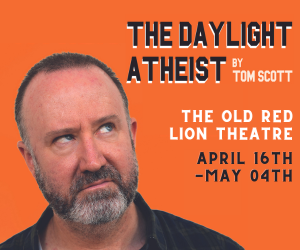Rebecca West was one of the supreme journalists and travel
writers of the 20
The production is beautifully designed and directed. Director Charlotte Westenra knows how to make the script breathe, and the importance of subtext; two of the most telling moments, at the end of each act, are created wordlessly.
But first, let’s hail a chamber musical of profoundly serious intent which can evoke a great depth of passion with the most scaled down of means. Whatever may be wrong with it, it’s thoughtful, subtle and adds distinction to the Fringe.
It’s perfect material for a musical. (In fact, DH Lawrence reviewed the novel as ‘a drama with music’.) A love quadrille, the four sides of the square are made up of Margaret, a working class girl who works behind a bar, who is married to William, a cheerfully prosaic manual labourer; Margaret was the first love of Captain Christopher Baldry, who returns from World War I with shell shock in the form of partial amnesia, fixated on a reunion with his former sweetheart. Unfortunately he is already married to Kitty, whose memory he had wiped out. The cast is completed by a cousin, Jenny, secretly in love with Baldry, who is the narrator of the novel, but whose role here is rather vague for much of the time. The musical explores the grief this gives to all concerned. Underneath the emotion there is also a strong critique of class, and of the values where a cure, to be effected by a Freudian psychiatrist Dr Anderson, means fitting Baldry to back into his slot in society, and sending him back to the slaughter on the Western Front.
So far so good; thematically coherent, well-shaped dramatically and concisely written. However, the delineation of character is patchy. Margaret doesn’t for a moment convince as a working –class girl. Granted, she is meant to be unusually sensitive and intelligent to catch the interest of Baldry, but there is nothing in her language to place her in class. Her rival, Jenny, bears the brunt of the critique of class – shrill, selfish and narrow – but the effect is to make us lose all sympathy with her, which throws the balance between the characters out of kilter and loses dramatic tension. She may be unhappy, but we don’t care. Most problematic is the psychiatrist, Dr Anderson; the authors can’t decide whether he’s a figure of fun, of horror, of authority, or as much a victim of society as everyone else.
Nor can it be said be said that the songs live up to the potential of their context. Essentially they are static, explorations of mood and feeling, and don’t push the action forward; with twelve songs in Act 1, it slows the thing down considerably. Tim Sanders isn’t nearly as good a lyricist as librettist; he relies excessively on the use of half-rhymes, which in musical terms is the equivalent of a muffled punch. They lack that sense of concision and inevitability which keeps an audience hanging on them, and sometimes don’t quite make sense, even if you sort of know what he’s getting at (“Am I what you are to me?”). The music by Charles Miller is scored for cello and piano, which suggests a kind of autumnal quality – late Elgar, maybe – which is not so prominent in the score itself. The three women lack musical differentiation, in a score which is all too generic contemporary music theatre. The men come off best musically – Baldry’s nightmares are very effective, strident and discordant, and William’s sweet domesticity, “not something out of a romantic novel, more a gentle to and fro”, owes something to the parlour ballads of the time. Music director Simon Lambert needs to pull back, because he sometimes forces the cast to over-project, or be lost. Best of all are the ensemble numbers, which are by far the most musically inventive sections, and achieve the kind of operatic intensity we could do with elsewhere.
The production is beautifully designed and directed. Director Charlotte Westenra knows how to make the script breathe, and the importance of subtext; two of the most telling moments, at the end of each act, are created wordlessly. She gives the cast space to breathe, and they seize it gratefully. This is a vocally formidable quintet and they all pack a punch, although Stewart Clarke is outstanding as the love object of the three women, charismatic and tortured. Michael Matus registers strongly as the long-suffering husband and comic relief, William. It could have been one of those ‘gor blimey guv’nor’ patronising parts, but it has a gentleness and reticence which is wholly convincing.
This is clearly meant to be a ‘women’s musical’, in the sense that we talk of ‘women’s pictures’ of the 1950s. Baldry is something of a cypher to be fought and agonised over, and the main interest is in the feelings of the rival women. (We even get the Colin Firth/Darcy wet shirt moment.) But paradoxically, by the end, Baldry is really the only one whose fate and feelings the audience cares about.
If West’s reach exceeded her grasp, so too does that of Sanders and Miller. But it is excellent, indeed vital, for the future of musical theatre that people like them are reaching out into new territories, and for that we should all applaud and support them.









